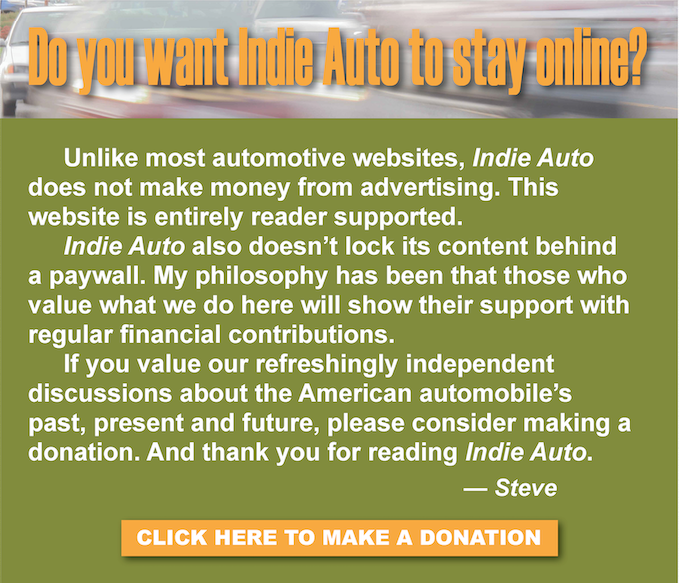
Peter DeLorenzo (2023a) recently made a big deal about how he supposedly transformed the automotive media. He argued that “the key differentiator for me was that I didn’t care about access, because I not only knew the Detroit auto executive mindset intimately, inside and out, I had it down cold.”
That sounds good because “access journalism” typically results in less critical analysis. Reporters and their publications can justifiably fear that if they engaged in hard-charging “accountability journalism” that they could lose their access or even be attacked. We discuss the dangers here.
This raises a basic question: Without access, how does DeLorenzo get his auto industry intelligence?

Did you know DeLorenzo does auto consulting?
His LinkedIn profile points to an interesting possibility. It says that he has been the publisher of the Auto Extremist website as well as the president of Autoextremist.Agency. Here’s how the latter is described:
“Through his company Autoextremist.Agency, DeLorenzo consults on automotive marketing and advertising strategies, advertising execution, product direction and content, public relations strategies, the business of motorsports, motorsports marketing and sponsorship development. DeLorenzo also engages in executive coaching.” (DeLorenzo, 2023b)
Running a mouthy website and a consulting shop simultaneously sounds like a difficult combination . . . unless the latter acts as a protection racket of sorts (“keep me on retainer and my website will go soft on you”). Another scenario: DeLorenzo doesn’t sound like he has terribly good social skills, so perhaps the consulting gigs fizzled out long ago after he pissed off everyone.
Nevertheless, as I write this post his LinkedIn profile says that the consulting shop and the website are still active. Since both were launched in 1999, a reader could reasonably assume that he’s had consulting relationships with automakers for 24 years.

How does DeLorenzo avoid conflicts of interest?
If indeed DeLorenzo has been a consultant all those years, readers deserve to know how has he managed to steer clear of conflicts of interest in his writings. If he has discussed this before I’ve missed it.
For example, I don’t see anything on the “About AutoExtremist” page that addresses ethical issues. All I see is his usual bravado, such as from “Day One, the real essence of Autoextremist.com was the fact that I said what others were merely thinking, or would only discuss in ‘deep background’ and in ‘off-the-record’ conversations. It was never a ‘touchy-feely’ publication that coddled its readers and genuflected at the feet of the car companies. There’s plenty of pabulum in this world” (DeLorenzo, 2023c).
Also see ‘Peter DeLorenzo continues to continue with his usual swagger’
That’s true to a significant degree. DeLorenzo has shown himself to be a ferocious attack dog. However, the question is whether he has treated differently those who he has worked for as a consultant.
For example, DeLorenzo once called Dan Akerson an “Unctuous Prick extraordinare” (2014, original italics). Would he have written that if he had been providing executive coaching services to the former General Motors CEO?
Another example: Last week Auto Extremist published a “Brand Image Meter” article (DeLorenzo, 2023d). A goodly part of this feature is an assessment of advertising campaigns. How would the reader know if the rankings had been influenced by whether DeLorenzo has done any consulting work on that topic with a given brand or automaker?

This is why journalism has a code of ethics
The Society of Professional Journalism’s (2014) code of ethics partly deals with conflicts of interest. For example, the code states that journalists should:
- “Avoid conflicts of interest, real or perceived. Disclose unavoidable conflicts.
- “Refuse gifts, favors, fees, free travel and special treatment, and avoid political and other outside activities that may compromise integrity or impartiality, or may damage credibility.
- “Be wary of sources offering information for favors or money; do not pay for access to news. Identify content provided by outside sources, whether paid or not.
- “Deny favored treatment to advertisers, donors or any other special interests, and resist internal and external pressure to influence coverage.”
To what degree does DeLorenzo follow this code? At the very least, he doesn’t appear to have disclosed his clients. Thus, it seems cheeky for him to beat up on automotive reporters who practice access journalism if they have been diligently following SPJ’s code of ethics.
Also see ‘Peter DeLorenzo draws questionable lessons from automotive history’
The bottom line is that when DeLorenzo lauds a particular automaker or executive, the average reader doesn’t have a way to tell whether that represents his independent judgment or is colored by present or past consulting relationships. This undercuts the credibility of his punditry — no matter how hard he pounds the table about how feared he is by industry executives.
So if DeLorenzo is no longer consulting, he might want to update his LinkedIn profile. And if he is still working with any automakers, journalism ethics requires that he disclose who they are when he writes about them. Refusing to do so would not be the “unvarnished, high-octane truth.”
Share your reactions to this post with a comment below or a note to the editor.
RE:SOURCES
- DeLorenzo, Peter; 2014. “We May Never Pass this Way Again. GM At A Crossroads.” Auto Extremist. Posted April 4.
- ——; 2023a. “Twenty-Four Years of the High-Octane Truth.” Auto Extremist. Posted May 28.
- ——; 2023b. “Peter M. DeLorenzo.” LinkedIn profile. Accessed June 19.
- ——; 2023c. “About AutoExtremist.” Auto Extremist. Accessed June 19.
- ——; 2023d. “The AE brand image meter The ‘we told you so’ edition.” Auto Extremist. Posted June 12.
- Society of Professional Journalists; 2014. “SPJ Code of Ethics.” Revised Sept. 14.






Be the first to comment